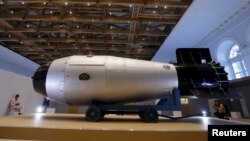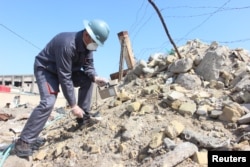Russia’s absence from the Nuclear Security Summit in Washington this week raises questions about the international community’s ability to keep nuclear materials out of the hands of the Islamic State (IS) and other terrorists, say analysts.
The summit will feature a special session aimed at preventing and minimizing the threat posed by unsecured nuclear material but analysts see a breakdown on nuclear security cooperation between the United States and Russia they think hinders attempts to address that threat.
“Russia is key,” said Tom Collina, Director of Policy at the Ploughshares Fund. “It’s a huge hole in the process not to have them there.”
A number of countries – including Pakistan – have security gaps but the size of Russia’s stockpile and the sheer lack of information are causes for concern. Russian and U.S. stockpiles together account for 90 percent of the highly enriched uranium in the world and more than half of all plutonium.
Russian threats
“Since cooperation has wound down, a lot of what we’ve lost is information in terms of what’s going on,” said Collina. “That’s one of the scary things – it’s hard to know what’s going on in Russia.”
An Associated Press investigation last year found a thriving black market for nuclear material in Moldova, where authorities are concerned that criminal organizations are smuggling radioactive materials out of Russia and selling to the highest buyer.
Collina noted the few materials that have come on the black market have tended to be traced back to Russia as the source.
“We know that Russia has large stockpiles of materials. They have an economy that’s in crisis and so that’s a combination of real trouble, and we need more information on what’s happening in Russia, and we need more cooperation so that we can assist with the process,” he said.
Nuclear threats could originate from a number of areas, including an improvised nuclear device built using stolen highly enriched uranium or plutonium, a sabotage of nuclear facilities or a dirty bomb combining explosives with radioactive materials. The attacks in Paris and Brussels have only intensified ongoing concerns, and according to Collina, terrorists could exploit a number of Russian vulnerabilities to achieve those goals.
“Are they putting enough resources into the process of securing these materials? Are they keeping their scientists who know about this stuff engaged so that their knowledge is not leaking across borders? We just don’t know,” Collina said.
US efforts
Russia’s refusal to attend the summit is further complicated by its lack of participation in several international nuclear agreements aimed at cleaning up and securing nuclear materials.
“There are a wide range of treaties the Russians have decided not to participate in so there has to be some sort of political change in Moscow that says we’re going to lower the tensions with the United States and the West and we’re going to re-enter into the agreements we signed to previously,” said Frank Miller, a former senior director for defense policy and arms control at the National Security Council, which advises U.S. presidents.
White House Deputy National Security Advisor Ben Rhodes called Russia’s absence from the summit “a missed opportunity,” but also said “it is important for the world to see and to know that the United States and Russia have continued cooperation on issues related to nuclear security.
Rhodes said three-quarters of the more than 260 national commitments made in previous nuclear security summits have been implemented. But those commitments may not be to the same standards as the United States.
“When it comes down to it, there are no legally binding obligations for countries to implement the kinds of security measures that, for example, the U.S. has on its nuclear material and nuclear facilities and also on radioactive sources,” said Sharon Squassoni, director of proliferation programs at the Center for Strategic and International Studies.
Collina says that while real progress has been made in past nuclear summits, recent reports of IS activities in Belgium around nuclear facilities and tracking nuclear engineers suggest more needs to be done.
“The interest is out there, the ability is out there, the will is out there and we are not keeping pace with that threat.”





